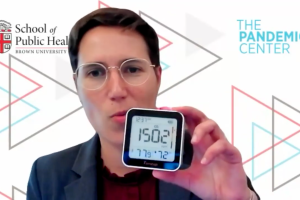The Clean Indoor Air Initiative
Clean Indoor Air Resources
Resources and other publications produced by the Clean Indoor Air team to help local state leaders and organizations.
Project Highlights
Indoor air quality is one of the greatest unmet public health challenges, with poor indoor air quality contributing to asthma; infectious diseases such as COVID, flu, and RSV; and cognitive impairment (e.g., headaches, dizziness, loss of productivity). The Clean Indoor Air Initiative launched in 2024 with the recognition that clean indoor air is essential for health, productivity, and economic growth. The Initiative advances healthier indoor environments through developing policy roadmaps and playbooks; convening experts in the field; supporting state and federal legislative efforts; communicating the evidence-base for how cleaner air supports health; and creating implementation tools for schools, nursing homes, and other indoor spaces.
Coalition-building
- Hosting monthly meetings with the Clean Indoor Air Collaborative (30+ partner organizations) on clean indoor air action at the state level and developing a State Playbook for Cleaner Indoor Air with the collaborative.
- Convened a 30-person roundtable in partnership with the Texas A&M Biosecurity and Pandemic Policy Center to advance national indoor air quality policy. Building on the roundtable, we published a two-pager on IAQ priorities for the Federal Government and Congress to consider (with 20+ signatories).
Advancing state, federal, and international government action
- Convened government leaders in September 2025 for a United Nations side event on Healthy Indoor Air, with lead country co-sponsors Montenegro and France, to catalyze global action.
- Maintaining a database of proposed and passed state IAQ legislation, in partnership with the State Clean Indoor Air Collaborative and the Environmental Law Institute. In the past 5 years, 14 states have passed bills to improve IAQ.
- Provided technical expertise to inform the development of Rhode Island bills H5597 and S0977 around indoor air quality in RI schools, building a coalition with the American Lung Association of Rhode Island and the Asthma and Allergy Foundation of America. The Senate bill passed unanimously with bipartisan support (June 2025), and both bills will be revisited during the next legislative cycle.
- Leading the Policy Working Group of the Global Open Air Quality Standards initiative to develop a policy framework for universal air quality standards.
Sector-specific work
- Advancing cleaner indoor air in nursing homes by leading a project in partnership with CDC and the American Health Care Coalition (the association representing over 15,000 long term care facilities in the U.S.). The project is developing a toolkit for nursing home leaders on how and why to improve indoor air quality, aiming to support the health of over 1.3 million elderly in U.S. nursing centers.
- Helped organize the Stanford Clean Indoor Air Forum (April 2025) to bring private sector leaders together to advance IAQ performance standards in commercial buildings and pave the way for routine IAQ monitoring in buildings.
- Improving IAQ in schools through partnership with the Center for Green Schools, the Boston Public School District, and Boston University to develop a case study on how schools can incorporate routine IAQ monitoring to improve the air quality indoors.
Our Project Team
The team is composed of Georgia Lagoudas, Sabrina Chwalek, Alice Im, and Skandan Ananthasekar along with partnerships with Beth Cameron and other Pandemic Center members. Team members also include past and present Brown undergraduate students.
Clean Indoor Air Project Team
-

Georgia Lagoudas, Ph.D.
Senior Fellow -

Sabrina Chwalek
Visiting Fellow -
Skandan Ananthasekar
Visiting Fellow -

Alice Im
Research Assistant -

Mary Claire Warren
Summer 2025 UTRA -

Ruviha Homma
Summer 2025 UTRA -

Huyen Nguyen
Summer 2025 UTRA -

Porter Culp
Fall 2025 UTRA -

Mathieu Greco
Fall 2025 UTRA
Our Partners
- Brown University Long-Term Care Quality & Innovation Lab
- American Health Care Association
- U.S. Centers for Disease Control and Prevention
- Texas A&M University Biosecurity and Pandemic Policy Center
- Stanford University Department of Emergency Medicine
- Australian Academy of Science
- Burnet Institute of Australia
A Global Call to Action
"Healthy Indoor Air: A Global Call to Action," the inaugural High-Level Side Event on indoor air quality at the United Nations Headquarters.
Read More About The Clean Indoor Air Initiative
A Quarter of States Have Advanced Healthy Indoor Air Legislation–But Action Still Falls Short
Vendors quickly began promoting a range of products claiming to clean the air and prevent infections, leaving decision makers to weigh those claims and determine what, if anything, to do. Could cleaner indoor air really help reduce the spread of respiratory viruses like COVID-19?
---
